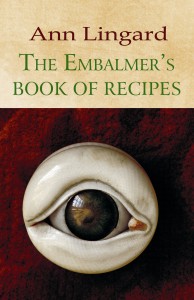embalmer
The Embalmer’s Book of Recipes: Extract
 Lisa is sure that she has inherited her mathematical ability from her father.
Lisa is sure that she has inherited her mathematical ability from her father.
That conversation, last year, was a simple three-bar histogram in grey. She was in his workshop in the garden, watching as he machined a lump of grey steel, turning it into a thick-walled cylinder. A squealing descant of pared metal occasionally rose above the solid low hum of the lathe. Glittering spirals fell onto the floor and she bent down to pick up several, as she had always done since she was a child.
‘Dolls’ hair.’ Her Dad smiled at her through his visor. ‘ Wasn’t that what you used it for?’
‘Pigs’ tails, sometimes. But yes, dolls’ hair, very curly and wiry. And it didn’t remain stuck on for very long, did it? Mum was always grumbling about the bits scattered over the flat.’ She smiled back as she stretched and released the coils. ‘All that waste. I wish I could think how to use swarf at work, to demonstrate something abstract.’
He lifted his visor, then released the cylinder from the chuck and brought it across to the work-bench in the middle of the floor and held it out to her.
‘What’s it going to be?’ Lisa asked, stroking the polished surface.
‘I’m going to drill a hole and put a twenty-thou screwthread in – then there’s a little widget to be made to screw in and – you don’t really want to know, pet, do you? You’re just humouring your Dad.’
She laughed. ‘You know that’s not true, I’ve always liked coming out here to watch you.’
‘Aye, many’s the time you’d come out here to escape from your sister. I often wondered if you’d have gone into something more practical like this if you’d been a bit bigger. But there we are – now Suzie’s the practical one, with all her cookery classes, and you’re the airy-fairy one. There’s no telling, pet, is there?’ And he asked, as so often before, ‘And where do you get all that mathematics from, that’s what I always want to know.’
She had often wondered, too, but standing there in the workshop, she had seen the answer and had laughed at its obviousness.
‘Why, from you! Think about what you’ve just been doing - you think and work in three dimensions, you can see in your mind how these complicated structures fit together. What I do is only a few degrees different from what you do, Dad, except that what I do is mostly invisible and can’t be put into practice. But you can spin a surface in two dimensions and turn it into three. Just like that! I have to figure it all out with equations.’
We both deal in the beauty of shapes, she had thought later. We both construct real and imagined dimensions. I should have told him that.
Three grey blocks, stepwise from small to large; her father, the workbench, and her. Was she represented by the one at the lower end of the scale, or by the greatest? She had been amused by the insight that it depended upon the method of classification she selected.
© Ann Lingard 2009

Comments